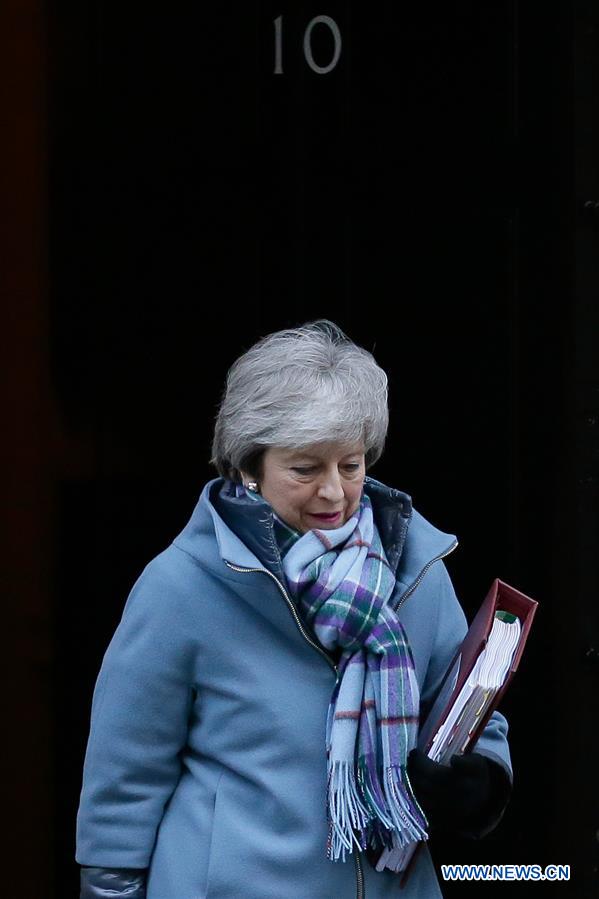
British Prime Minister Theresa May leaves 10 Downing Street for Prime Minister's Questions in the House of Commons in London, Britain, on Jan. 30, 2019. The British House of Commons on Tuesday passed an amendment to allow Prime Minister Theresa May to renegotiate a Brexit deal with the European Union (EU) despite repeated warnings from Brussels that it does not want to reopen the treaty signed off by the other 27 EU leaders. (Xinhua/Tim Ireland)
LONDON, Jan. 30 (Xinhua) -- The British House of Commons on Tuesday passed an amendment to allow Prime Minister Theresa May to renegotiate a Brexit deal with the European Union (EU) despite repeated warnings from Brussels that it does not want to reopen the treaty signed off by the other 27 EU leaders.
By 317 votes to 301, parliament members gave their backing to May's deal which they rejected earlier this month, providing changes are made to the so-called Irish backstop border issue.
In less than two months for Britain to leave the EU on March 29 by default, London is seeking an orderly Brexit while preparing for a possible no-deal divorce.
CLEAR REJECTION
The majority of 317 for May's deal gives her a mandate to return to Brussels to call for a re-opening of negotiations, and indicates that the Brexit deal is likely to win the critical final vote in the British parliament if changes are made to the Irish border issue.
However, speaking immediately after the vote in the British parliament, a spokesman for European Council President Donald Tusk said the backstop was part of the withdrawal agreement and not up for negotiation. "The December European Council Conclusions are very clear on this point."
"We will continue our preparations for all outcomes, including a no-deal scenario. We will also continue the EU's process of ratification of the agreement reached with the UK government," the statement said.
Meanwhile, French President Emmanuel Macron said on Tuesday that the EU has to prepare for a possible hard Brexit as the agreement reached between Britain and the EU is not renegotiable. The Irish backstop is an EU position of last resort, to maintain an open border on the island of Ireland in the event that Britain leaves the EU without securing an all-encompassing deal. There are concerns in Britain that the proposed backstop could "trap" Britain inside the EU customs union, should Britain and EU couldn't reach a comprehensive deal after Brexit. Both London and Brussels committed to avoiding the return of a "hard border" after Britain leaves the EU in March.
CONCERNS GROWING
Out of the seven amendments voted in parliament on Tuesday, only two were passed. The other is a non-binding call on the government to rule out no-deal Brexit.
A much-anticipated amendment to postpone Brexit by nine months if no deal is agreed by Feb. 26 was rejected by the British parliament.
Adam Marshall, director general of the British Chambers of Commerce, said another day had been lost while the clock is ticking. "Government and parliament are still going round in circles when businesses and the public urgently need answers."
Stephen Martin, director general of the Institute of Directors said: "The prime minister clearly faces a difficult task in winning a compromise on the backstop. However, if the choice is between trying to change the deal and leaving without one, business will have to hope the EU can be flexible and consider whether any legal changes at all could further clarify that the backstop is not a permanent fixture."
The British pound dipped against major currencies on Tuesday amid voting in the parliament.
The pound fell by 0.7 percent against the U.S. dollar and 0.8 percent against euro while it was down by some 0.1 percent against both currencies just before the parliament vote began.
The pound has roared higher in recent weeks as investors discount the chances of Britain crashing out of the EU without a deal, said Luke Trevail, currency analyst at TorFX, before the vote.
Responding to the parliament vote, Carolyn Fairbairn, director-general of the Confederation of British Industry (CBI), said: "This is another deeply frustrating day for British business. The never-ending parliamentary process limps on while the economic impact of no-deal planning accelerates." "Firms will welcome confirmation that a majority of MPs oppose a no deal outcome. But rejecting a no deal doesn't get a deal. Until MPs can agree a solution, delay will do nothing to lift the threat of an economic cliff edge that is draining money from the UK," Fairbairn said.











